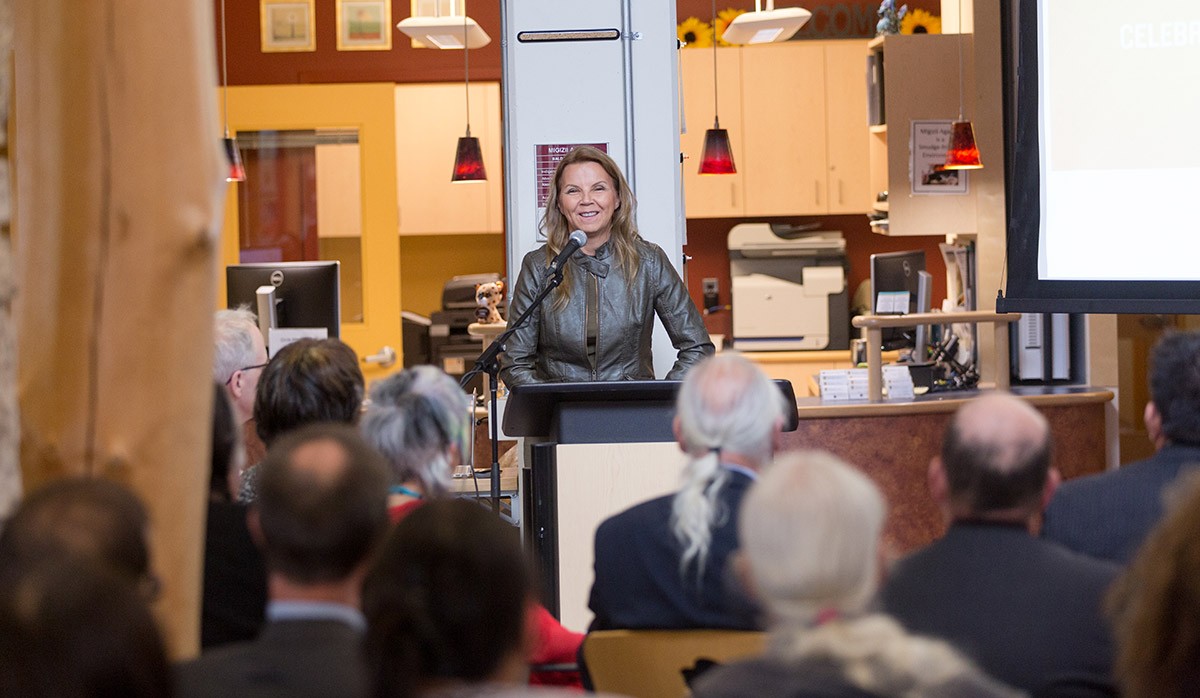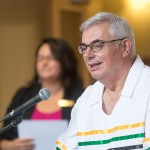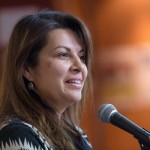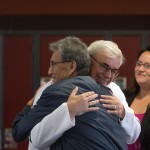
Debra Beach Ducharme speaks at the 2016 Indigenous Homecoming // Photo by Adam Dolman
Looking back, moving forward
Indigenous Homecoming event showcases alumni who are advancing Indigenous education and Reconciliation
The U of M recently signed the Manitoba Collaborative Indigenous Education Blueprint. Educational partners across Manitoba pledged to make our province a global centre of excellence for Indigenous education, research, languages, and culture. This year’s Indigenous Homecoming, held on September 21, celebrated this partnership as leaders from the U of M’s Indigenous alumni community shared their experiences and stories of growth in the field of Indigenous education.
In his opening comments President and Vice-Chancellor David Barnard spoke of the Blueprint and the University’s commitment to working together to advance Indigenous achievement.
“It was an historic day,” said Barnard. “The Indigenous community, Manitoba’s post-secondary institutions and public school boards, came together to make a commitment to advancing Indigenous education and reconciliation.”
“Together, we took action on the Truth and Reconciliation Commission’s recommendations.”
As part of the Indigenous Homecoming event two alumni helped kick off the department of Native Studies’ fall colloquium. Rebecca Chartrand [BEd/97, MEd/16], division team lead for Aboriginal education in the Seven Oaks School Division, and Debra Beach Ducharme [PBEd/96, MEd/09], formerly the director of education for Brokenhead Ojibway Nation, now college lead, northern medical unit in the department of community health sciences at U of M, shared their experiences with Indigenous education. These community leaders emphasized the need to include Indigenous perspectives and worldviews in education.
Chartrand’s presentation, based on her recent MEd dissertation, discussed Anishinaabe pedagogy. This traditional pedagogy is based on land-based learning, says Chartrand. “The land is our textbook and the people are our living library.”
Chartrand continued by talking about the need to evaluate current educational initiatives to understand where educators stand in terms of Indigenous education.
“The most important thing is that we [Indigenous educators] are finding our voice, and our presence in that,” said Chartrand. “As an Indigenous educator, I am constantly learning about my own history, which helps me feed my children’s spirit as well.”
Beach Ducharme continued those thoughts, addressing the need to include Indigenous perspectives in education. She spoke of her own experience of learning how to engage with Indigenous children in education. “My goal as a teacher was to teach them about their identity and to be proud of that identity and see their identity as a gift from the creator.
“As it evolves, education must be inclusive of our worldview and teachings,” concluded Beach Ducharme. “[Education must] move from an individualistic to collectivistic worldview.”
Other speakers included Elder Norman Meade, Elder-in-residence; Frank Deer, acting executive lead for Indigenous Achievement; and Wanda Wuttunee, professor in the department of Native Studies.
These presentations are a part of the U of M’s dedication to moving forward with the Truth and Reconciliation Commission’s calls to action. On September 26 the Faculty of Education, in partnership with the National Centre for Truth and Reconciliation, will be hosting part one of a conference focusing on education for truth and Reconciliation.
Giga Maamaawii bimosemin/We Will Walk Together: A Conference for Truth and Reconciliation is an opportunity for UM teacher candidates, their cooperating teachers and faculty advisors, to gather at the U of M and to participate in practice-focused workshops. The purpose is to provide participants with information about the TRC findings and to experience how the Calls to Action are being enacted by Manitoba teachers.
For more information on UM’s commitment to Indigenous Achievement visit umanitoba.ca/indigenous









